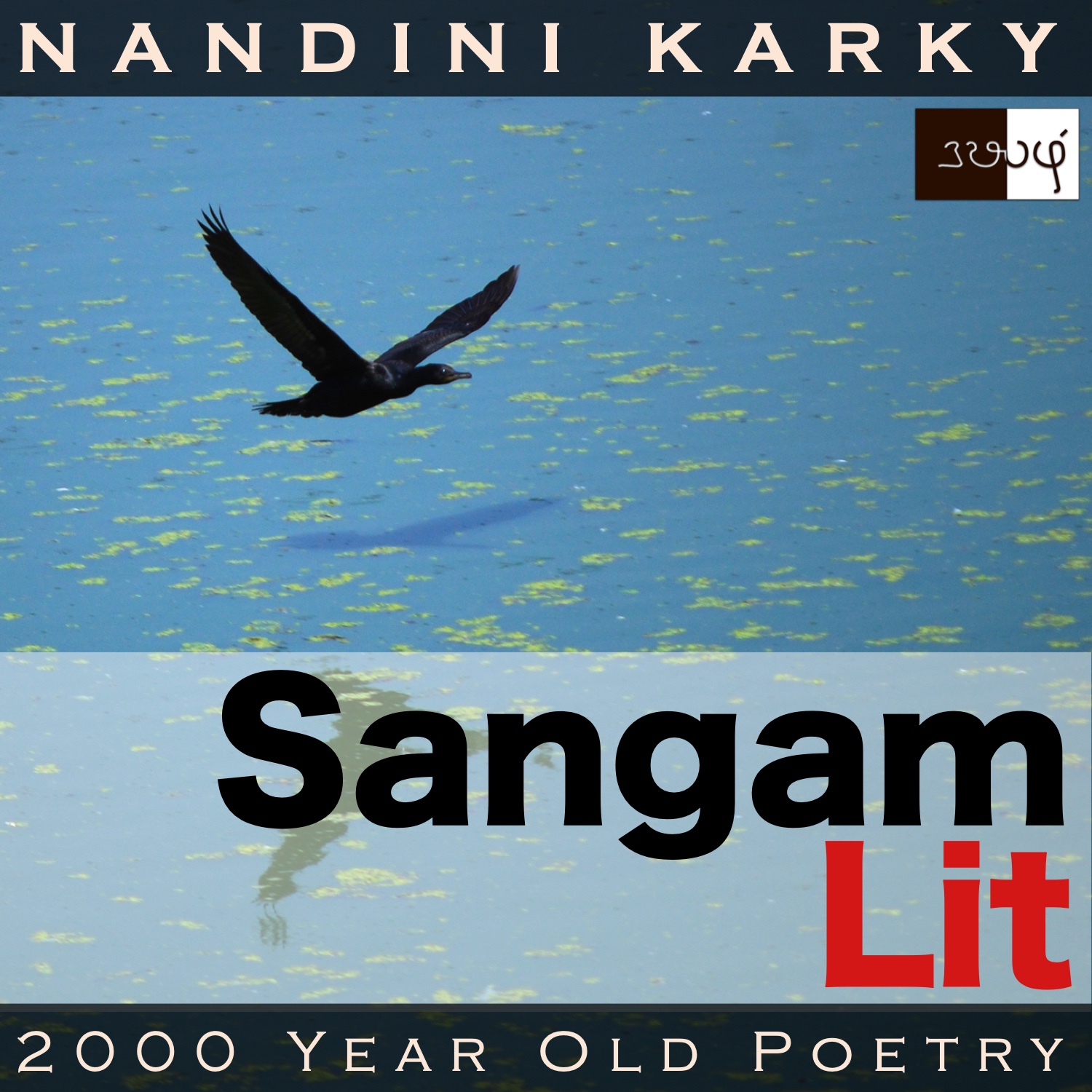Podcast: Play in new window | Download
Subscribe: Apple Podcasts | Spotify | Amazon Music | Android | iHeartRadio | TuneIn | RSS | More

In this episode, we observe the poetic richness of Sangam literary work Natrinai 27, written by Kudavayil Keerathanaar, set in the ‘Neythal’ landscape or the coastal regions, in the words of the lady’s confidante to the lady, as the man listens by.
நீயும் யானும், நெருநல், பூவின்
நுண் தாது உறைக்கும் வண்டினம் ஓப்பி,
ஒழி திரை வரித்த வெண் மணல் அடைகரைக்
கழி சூழ் கானல் ஆடியது அன்றி,
கரந்து நாம் செய்தது ஒன்று இல்லை; உண்டு எனின்,
பரந்து பிறர் அறிந்தன்றும்இலரே-நன்றும்
எவன் குறித்தனள் கொல், அன்னை?-கயந்தோறு
இற ஆர் இனக் குருகு ஒலிப்ப, சுறவம்
கழி சேர் மருங்கின் கணைக் கால் நீடி,
கண் போல் பூத்தமை கண்டு, ”நுண் பல
சிறு பாசடைய நெய்தல்
குறுமோ, சென்று” எனக் கூறாதோளே.
The way this poem started put a smile on my face for it seemed to me like an endearing word-bouquet! ‘நீ’, ‘யான்’, ‘நெருநல்’, ‘பூ’, meaning ‘you’, ‘me’, ‘yesterday’ and ‘flower’. The stuff of melodious songs many! ‘நெருநல்’ the beautiful word for ‘yesterday’, we encountered in yesterday’s poem, makes an appearance again. ‘வெண் மணல்’ brought forth images of pristine white sand that anyone living on the coast, yearns for. The close proximity of the words ‘இல்லை’ & ‘உண்டு’, meaning ‘no’ and ‘yes’, seemed to shine like the contrast in a campfire on the seashore. The promise of much in store invites us to move on.
With the expert guidance of poetic explorers, we are able to appreciate the intricacies in this poem. The situation is such that the man and the lady are in a relationship, unknown to others. The lady’s confidante talks to the lady knowing well that the man is in earshot, listening to her message. She says, “Yesterday, you and me, we did nothing but play chasing bees which dive into flowers and spread fine pollen, on the seashore filled with white sand, which the waves had soaked, set and separated from, in the middle of that beach filled with backwater streams. We did nothing that we wished to hide from the eyes of others. Even if there was something, it would have spread and reached everyone’s ears. But, that never happened. So, what could mother be thinking? Because, she does not bid us to go and gather those ‘Neythal’ flowers, those water lilies blooming like a maiden’s eyes, on those backwaters close to the sea, which a shark frequents and seeing which, those storks feeding on shrimps send out shrill calls in the air! Indeed, what could she be thinking?” With these hidden words, the lady’s confidante is conveying to the man that mother could be sensing his relationship with the lady and this is her way of nudging the man into formalising his relationship with the lady.
Now, let’s peel the layers of this poem and see further. First, the task these ‘Neythal’ or the coastal maidens seem to have, in chasing bees that swarm the flowers. As we have seen in many Natrinai poems this far, the ’Kurinji’ girls or young women from mountainous regions had the task of chasing parrots which come to raid the millet fields. This poem sheds light on the equivalent activity of young girls in the coastal region. By extending our imagination and analysis, we can see that this chasing of bees clothed in the pollen of flowers aids in the regeneration of these flowers and trees. This could be a way of telling the bee, ‘Don’t just be drunk with the nectar of the flower. Go, do your job and spread life!’ Is there a hidden message to the man hearing nearby? Could be. Then we come to the description of the shark that roams the waters and the storks feeding on shrimps making shrill cries in the air. Again, we might think that it’s a casual reference to a seaside scene. However, the shark is a metaphor for the man and those screaming storks are akin to the gossiping town, who are sure to take rumours of this relationship afar. We see how this poem by evoking images that are seemingly commonplace is actually depicting intricacies of inner life in the Sangam era. I can only wow at the intensity of attention that these poets have bestowed on the world around them. Be it the birds or the bees, they have taken in the soul of life and sprinkled it on their work. Finally, in that scene with the bees, what we considered a message to the man could be a message to us too. Many a time, we are lost in mere pleasures and lose sight of our bigger purpose. Perhaps, at times, we too should heed the claps of these ‘Neythal’ maidens and buzz towards our calling!




Nice narration.congrats
This poem puts a smile in my face. Brilliant intervention of hidden message to bee.